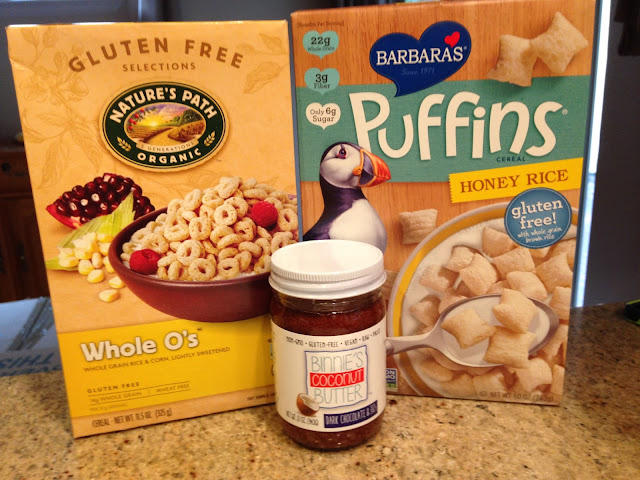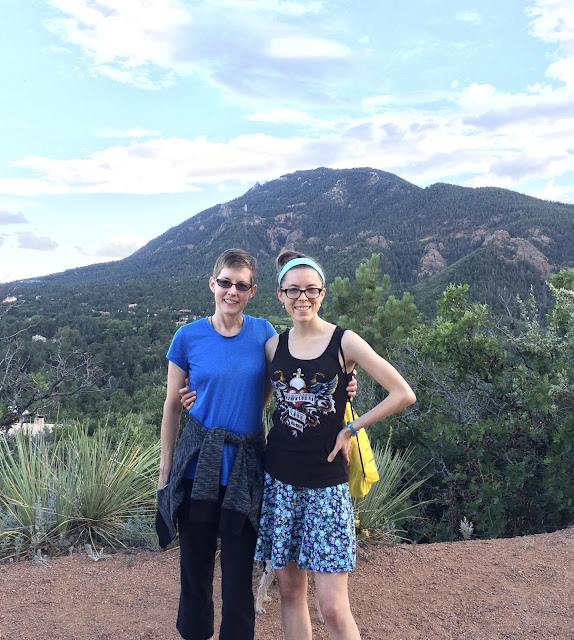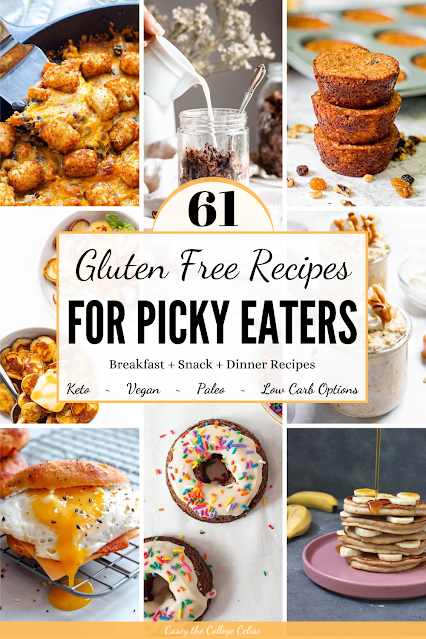A Celiac's Presidential Debate: 4 Gluten Free Controversies
Whether you wanted to or not, you probably heard plenty about the first and second Presidential Debates of this election. In particular, you've probably heard countless questions like: Who won? Who made the most offensive comments? Who is Twitter really roasting afterward?
1. Cheer or fear for GF Cheerios
Perhaps the most public - and one of the most controversial - debates today is over Cheerios' new gluten free products. You might remember enjoying cheerios for breakfast every day before elementary school...and you may have even rushed to buy yourself a box of edible nostalgia when Cheerios announced that they were going gluten free back in 2015.
Unless you can be certain of a company's cross-contamination protocol (dietitian Tricia Thompson suggests checking that the company checks for gluten CC using the R5 ELISA test), celiacs should likely steer clear of wheatgrass and barely grass - no matter how many "superfood" properties they might claim.
3. Gluten intolerant or ignorant?
If you're an (awesome) long-term reader of my blog, you've probably noticed me mention that my mom eats gluten free, but doesn't have celiac disease. Like the other six percent of Americans, my mom identifies as gluten intolerant and has noticed a significant improvement in her health by ditching wheat. As you might expect, then, I personally see gluten intolerance as a legitimate medical condition.
Not everyone thinks this way, however. Not sure what I'm talking about? Here are just a handful of the scientific studies that have seemingly disproved the existence of gluten intolerance:
Do you believe in gluten intolerance - or even have it yourself? That's for you, your body, and your doctor to decide. Keeping these studies in mind, though, may make your medical search a little easier.
4. Bottom's up...or gluten-removed beers down.
After you trudge through these controversial celiac debates, you may feel like you need a drink...but you should be careful what kind of beer you choose. Recently, Gluten Dude has raised awareness of the two types of gluten free beers hitting the market: "gluten-removed" and "gluten free."
For those who haven't hit 21 yet - which I only just did - or haven't explored the gluten free section of your grocery store's alcohol aisle, "gluten removed" beer refers to beer - like Omission Beer - that is made with gluten (like barely) but then removed using enzymes. Rather than entirely "removing" the gluten, though, this process actually just breaks down the grains. While the companies may advertise that the gluten doesn't exceed the 20 PPMs required by the FDA, some people have still reported becoming sick from the products.
"Gluten free" beer, on the other hand, never contains gluten; instead, as the people behind Ground Breaker Brewing, Ghostfish Brewing and Glutenberg explain, they start with naturally gluten free ingredients. Like with any other gluten free product, the beers could become cross-contaminated if the company isn't careful with its ingredients' sources. As long as the company pays attention to the vendors it buys from and the ingredients it brings into the brewery, however, their beers cannot only be under the 20 PPM gluten requirement, but they can even boast 0 PPM gluten.
So should celiacs ever reach for a bottle with "gluten removed" on the label? Unless celiacs can know exactly how much gluten has been removed from the beer - which, according Prevention.com, is still unknown thanks to legal red tape - that remains a very blurry question.
*Also found at Terrific Tuesday, Wow Me Wednesday, RunningwithSpoons I Heart Nap Time, ShareFest and Wine'd Down Wednesday!*
In the celiac community, equally important debates are going on - but on community screens instead of TVs, and about other celiacs' health rather than the country's.
What are four gluten free debates every celiac should keep an eye on? Continue reading to find out how up-to-date you are on celiac news.
1. Cheer or fear for GF Cheerios
Perhaps the most public - and one of the most controversial - debates today is over Cheerios' new gluten free products. You might remember enjoying cheerios for breakfast every day before elementary school...and you may have even rushed to buy yourself a box of edible nostalgia when Cheerios announced that they were going gluten free back in 2015.
Since then, however, the celiac community has become divided in their support. Does the phrase "Cheerios recall" sound familiar? It occurred shortly after the gluten free Cheerios were rolled out. In fact, 1.8 million boxes were recalled due to "undisclosed wheat" and the FDA states that at least 125 people reported becoming sick. It was later revealed that:
The Cheerios controversy resurfaced earlier this year when the Canadian Celiac Association released a statement that discouraged celiacs from eating gluten free Cheerios because of the cross contamination risks.
Will you dive into a bowl of gluten free Cheerios anytime soon? That's a personal decision every celiac - or parent of a young child with celiac disease - must make for him or herself.
2. Wheatgrass and barley grass - yay or nay for the celiac?
Even though I like to think that I have more experience with superfoods than the average eater, I hadn't heard of "wheatgrass" until recently. First, when I excitedly learned of MammaChia's new Greens line of juices. Then Aloha approached me for a possible review of some of their products (which will be sharing in a few weeks, so my chocoholic readers better be ready to drool!). As I scanned ingredients, as is my usual habit even when a product is marked "gluten free," the word "wheatgrass" sent off a red alarm. These examples aren't meant to shed bad light on these companies; in fact, I love them both! Instead, they're meant to show how common this "superfood" is becoming.
What exactly is wheatgrass - and how can it be "gluten free"...but not? To understand, we need to take a trip back to biology class, particularly the botany section. As verywell.com explains, wheat and barely grass only contain gluten in the seeds that they produce. Hypothetically, then, barely and wheat grass can be "gluten free" as long as they are pure and aren't cross-contaminated with the seeds during harvest.
- The oat flour used in one of plants was switched with wheat or, at the very least, cross-contaminated.
- General Mills didn't test the resulting cereals for gluten for two weeks, despite claiming to do so daily.
 |
| My preferred "O" cereal... |
The Cheerios controversy resurfaced earlier this year when the Canadian Celiac Association released a statement that discouraged celiacs from eating gluten free Cheerios because of the cross contamination risks.
Will you dive into a bowl of gluten free Cheerios anytime soon? That's a personal decision every celiac - or parent of a young child with celiac disease - must make for him or herself.
2. Wheatgrass and barley grass - yay or nay for the celiac?
Even though I like to think that I have more experience with superfoods than the average eater, I hadn't heard of "wheatgrass" until recently. First, when I excitedly learned of MammaChia's new Greens line of juices. Then Aloha approached me for a possible review of some of their products (which will be sharing in a few weeks, so my chocoholic readers better be ready to drool!). As I scanned ingredients, as is my usual habit even when a product is marked "gluten free," the word "wheatgrass" sent off a red alarm. These examples aren't meant to shed bad light on these companies; in fact, I love them both! Instead, they're meant to show how common this "superfood" is becoming.
What exactly is wheatgrass - and how can it be "gluten free"...but not? To understand, we need to take a trip back to biology class, particularly the botany section. As verywell.com explains, wheat and barely grass only contain gluten in the seeds that they produce. Hypothetically, then, barely and wheat grass can be "gluten free" as long as they are pure and aren't cross-contaminated with the seeds during harvest.
 |
| No wheatgrass needed in this smoothie! |
Unless you can be certain of a company's cross-contamination protocol (dietitian Tricia Thompson suggests checking that the company checks for gluten CC using the R5 ELISA test), celiacs should likely steer clear of wheatgrass and barely grass - no matter how many "superfood" properties they might claim.
3. Gluten intolerant or ignorant?
If you're an (awesome) long-term reader of my blog, you've probably noticed me mention that my mom eats gluten free, but doesn't have celiac disease. Like the other six percent of Americans, my mom identifies as gluten intolerant and has noticed a significant improvement in her health by ditching wheat. As you might expect, then, I personally see gluten intolerance as a legitimate medical condition.
Not everyone thinks this way, however. Not sure what I'm talking about? Here are just a handful of the scientific studies that have seemingly disproved the existence of gluten intolerance:
- 2011: A study by Peter Gibson at Monash University in Australia found that diets containing gluten does seem to cause gastrointestinal problems in certain people who do not have celiac disease. The name they gave to these people? Those with "non-celiac gluten sensitivity."
- 2014: Peter Gibson revisited the subject of gluten intolerance in a follow-up study and paper. In this case, however, he found "absolutely no specific response to gluten" in the 37 self-identified gluten-sensitive participants. What instead could be causing people to hold their stomachs and blame gluten? The "nocebo" effect - or the idea the patients expected to feel worse on the study diets and, as a result, did - or a sensitivity to fodmaps, instead of only gluten.
- 2015: Researchers from the University of L'Aquila in Italy threw their hat into the scientific ring as well, observing 392 self-identified gluten intolerants into a trial where they were first tested for celiac disease. Those who tested negative then ate gluten free for six months before reintroducing gluten into their diets and reporting any symptoms. The study eventually found that 93% of those who claim "gluten sensitivity" (and don't have celiac disease or a wheat allergy) can tolerate gluten without any negative results.
 |
| No gluten, no problem! |
Do you believe in gluten intolerance - or even have it yourself? That's for you, your body, and your doctor to decide. Keeping these studies in mind, though, may make your medical search a little easier.
4. Bottom's up...or gluten-removed beers down.
After you trudge through these controversial celiac debates, you may feel like you need a drink...but you should be careful what kind of beer you choose. Recently, Gluten Dude has raised awareness of the two types of gluten free beers hitting the market: "gluten-removed" and "gluten free."
For those who haven't hit 21 yet - which I only just did - or haven't explored the gluten free section of your grocery store's alcohol aisle, "gluten removed" beer refers to beer - like Omission Beer - that is made with gluten (like barely) but then removed using enzymes. Rather than entirely "removing" the gluten, though, this process actually just breaks down the grains. While the companies may advertise that the gluten doesn't exceed the 20 PPMs required by the FDA, some people have still reported becoming sick from the products.
 |
| The only "gluten free beverage" I've partaken in lately... |
"Gluten free" beer, on the other hand, never contains gluten; instead, as the people behind Ground Breaker Brewing, Ghostfish Brewing and Glutenberg explain, they start with naturally gluten free ingredients. Like with any other gluten free product, the beers could become cross-contaminated if the company isn't careful with its ingredients' sources. As long as the company pays attention to the vendors it buys from and the ingredients it brings into the brewery, however, their beers cannot only be under the 20 PPM gluten requirement, but they can even boast 0 PPM gluten.
So should celiacs ever reach for a bottle with "gluten removed" on the label? Unless celiacs can know exactly how much gluten has been removed from the beer - which, according Prevention.com, is still unknown thanks to legal red tape - that remains a very blurry question.
Maybe you love debates - whether between Presidential candidates or members of the gluten free community - and see them as opportunities for education, personal growth and increased awareness. Or, maybe you instead see debates as arguments tearing a country, or a community, apart. Whatever your mindset, one fact is certain: the more you know, the better informed your own choices, beliefs and actions become. And I think everyone can see the benefits resulting from that.
*Also found at Terrific Tuesday, Wow Me Wednesday, RunningwithSpoons I Heart Nap Time, ShareFest and Wine'd Down Wednesday!*
Are you closely following the Presidential debates and election? What other gluten free debates have you noticed? Tell me what you think in the comments!




1) You can't "clean off" grains that have been cross-contaminated. They are not safe if you're a real celiac.
ReplyDelete2) Not sure....but why take the chance? Who even uses that stuff anyway!
3) No I don't. I think people have FODMAP problems and/or dairy (since humans were not built to process it).
4) I really don't know...I think it's just like the cherrios thing.
AMEN to number 1!
DeleteI'm like your mommy! I choose to eat gluten-free because I have noticed adverse symtoms from gluten and gluten-rich foods, so I just avoid it as much as I can. I can't even tell you how much better I feel, mentally and physically. I actually had no idea about that Cheerios thing. Thank you so much for the heads up! I was actually looking into purchasing some, but maybe I'll just pass on them for a bit.
ReplyDeleteI'm glad to give you the head's up! Educated choices are always the best ones :)
DeleteThis comment has been removed by a blog administrator.
ReplyDeleteI dont really have any adverse reactions to gluten, but I choose gluten free when given the choice... even my hubby does too, which surprises me since he is usually resistant to healthy eating. ;-) - http://www.domesticgeekgirl.com
ReplyDeleteWhatever helps you feel your best!
DeleteNo surprise that this debate is so much more classy and respectful than the presidential! I'm still wary of Cheerios and I used to love them / was so excited when they became GF. Now I just don't know if I can trust it! They messed up big time!
ReplyDeleteHaha glad you enjoyed it! And yes, it will be very hard for Cheerios to earn back the trust of the celiac community.
Delete